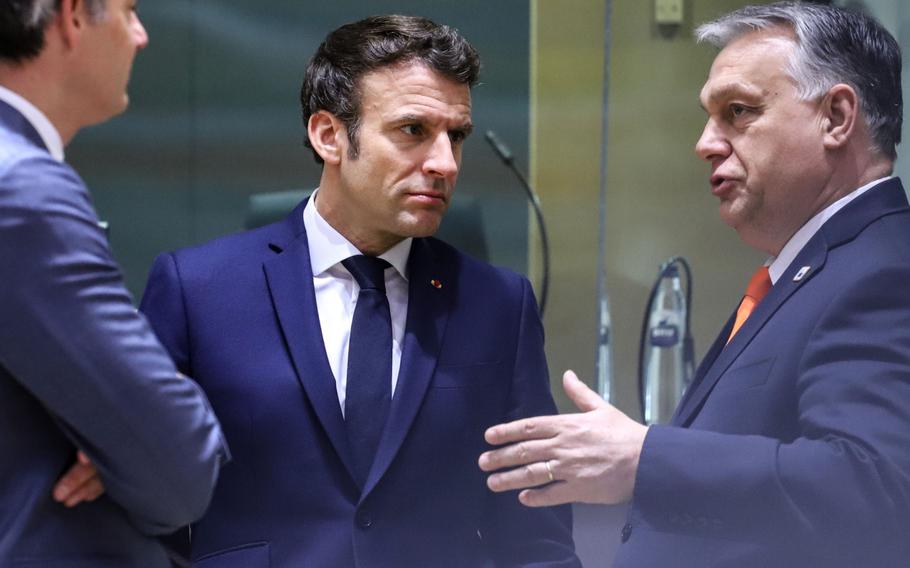
Emmanuel Macron, France’s president, center, and Viktor Orban, Hungary’s prime minister, at a European Union leaders summit to discuss security and defense in Brussels on March 25, 2022. (Valeria Mongelli/Bloomberg)
French President Emmanuel Macron and Hungarian Prime Minister Viktor Orban discussed energy security on Tuesday as the European Union seeks to persuade Budapest to drop its opposition to proposed sanctions on Russian oil imports.
"They talked about questions relating to European energy security," the Hungarian leader's press chief, Bertalan Havasi, told Bloomberg.
The EU, meanwhile, postponed a planned video call with Hungary and its neighbors. A spokesman for the bloc didn't immediately explain why that call, which European Commission President Ursula von der Leyen announced Monday night, was pushed off.
That call had been aimed at focusing on ensuring security of supplies and on solidarity mechanisms, a French spokesperson said, noting that Macron was planning to participate because France holds the EU's rotating presidency.
Hungarian Foreign Minister Peter Szijjarto said Tuesday that the time pressure from the EU side for a quick sanctions deal is "artificial," since it would take six to eight months for the ban to take effect.
Von der Leyen and Orban met for a working dinner on Monday, where they made progress but failed to reach a breakthrough, according to both sides. Orban is blocking the plan to phase out EU purchases of Russian oil, citing Hungary's reliance on Russian energy.
"We made some progress, we could say we took a small step forward," Foreign Minister Peter Szijjarto said in a Facebook video after the conclusion of Monday's talks. "A lot more needs to be done, though, for us to potentially change our position."
Von der Leyen said after the meeting that she'd convene a virtual conference to "strengthen regional cooperation on oil infrastructure."
The talks with Orban were "helpful to clarify issues related to sanctions and energy security," she said on Twitter. "We made progress, but further work is needed."
The EU's sixth sanctions package against Russia over its invasion of Ukraine would ban Russian crude oil over the next six months and refined fuels by early January. The EU had previously offered Hungary and Slovakia until the end of 2024 to comply with the sanctions and the Czech Republic until June of the same year since they are heavily reliant on Russian crude.
Orban said last week that nothing short of a five-year exemption and billions of dollars to cover the cost of overhauling Hungary's energy industry would make him back the new round of sanctions. He's said that he needs to be assured that Hungary will be able to obtain sufficient energy via alternative sources to meet its needs.
Hungary is seeking technical assurances that would guarantee its energy security given how reliant the country is on Russian supplies, according to people familiar with the discussions.
The importance of supplies from Kazakhstan is central to the discussion, along with guarantees on the investments needed to finance the transition away from Russia, including for infrastructure in Croatia, the people said.